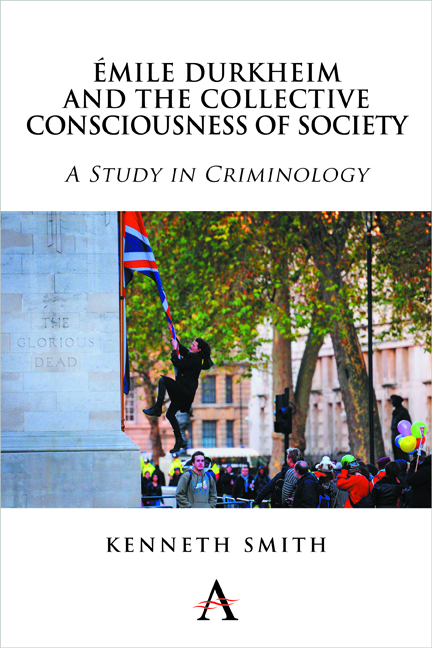Book contents
- Frontmatter
- Dedication
- Contents
- Epigraph
- Preface
- Introduction
- Part I The Concept of the Collective Consciousness of Society
- Part II The Form of the Collective Consciousness
- Part III Durkheim on Crime and Punishment
- Part IV Social Fact or Social Phenomenon? Durkheim's Concept of the Collective Consciousness as a ‘Social Fact’
- Part V Some Problems with Durkheim's Concept of the Common and Collective Consciousness
- Preface to Part V
- Introduction to Part V
- 17 Interdependence and the Division of Labour in Society
- 18 Durkheim on Socialism
- 19 Professional Ethics
- 20 Individualism, Durkheim and the Dreyfus Affair
- Conclusion to Part V
- Conclusion
- Appendix: On Paying a Debt to Society
- Notes
- References
- Index
Preface to Part V
from Part V - Some Problems with Durkheim's Concept of the Common and Collective Consciousness
Published online by Cambridge University Press: 05 October 2014
- Frontmatter
- Dedication
- Contents
- Epigraph
- Preface
- Introduction
- Part I The Concept of the Collective Consciousness of Society
- Part II The Form of the Collective Consciousness
- Part III Durkheim on Crime and Punishment
- Part IV Social Fact or Social Phenomenon? Durkheim's Concept of the Collective Consciousness as a ‘Social Fact’
- Part V Some Problems with Durkheim's Concept of the Common and Collective Consciousness
- Preface to Part V
- Introduction to Part V
- 17 Interdependence and the Division of Labour in Society
- 18 Durkheim on Socialism
- 19 Professional Ethics
- 20 Individualism, Durkheim and the Dreyfus Affair
- Conclusion to Part V
- Conclusion
- Appendix: On Paying a Debt to Society
- Notes
- References
- Index
Summary
In Part V of this book, and by way of a conclusion to our discussion of Durkheim's concept of the common and collective consciousness of society, I want to try to tie up some of the many loose ends in what we have said about this concept so far. In particular I want to look again in more detail at Durkheim's peculiar decision in his doctoral dissertation to focus on the division of labour as the means of creating the collective consciousness of a highly industrialized society and especially at his decision to neglect – and really I think we will have to say, to reject – the possibility that the ideology of socialism could perform this all-important role instead. I also want to consider in much more detail than we have so far why he apparently changed his mind so dramatically – in what I referred to earlier as an ‘epistemological break’ sometime around 1896 – on the all-important question of whether the common and collective consciousness could develop by themselves, unaided as it were, in societies characterized by organic solidarity, or whether, in what seems to have been his later view, it would need some considerable help in order to do this. I will argue that the main reason for the abrupt change in Durkheim's view on this question, for his renewed interest in the important role of religion in society, and for the dramatic shift away from his earlier interest in the question of crime and punishment, was as a result of his response to the events of the Dreyfus Affair.
- Type
- Chapter
- Information
- Publisher: Anthem PressPrint publication year: 2014



